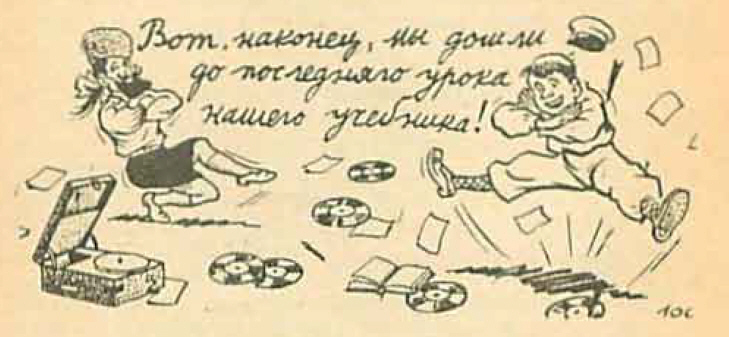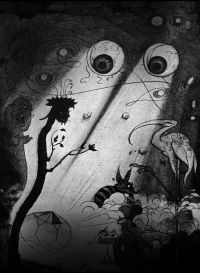RUSSIAN LANGUAGE
| Russian for English speakers 100 |
 |
| Lesson 100 |
|
396 |
Russian |
English Английский |
|
Сотый (100-й) урок |
Hundredth lesson |
|
|
УРОК НОМЕР СТО (№100) |
Lesson number hundred (#100) |
|
| Наш последний урок | Our last lesson | |
| 1 | Вот, наконец, мы дошли до последнего урока нашего учебника. (1) | [Hera is] at last, we have arrived at the last lesson of our handbook. |
| 2 | Это не значит, что мы кончили нашу работу. | This does not mean that we have finished our work. |
| 3 | Нам ещё остаётся проследить "вторую волну" до конца, | We have still the "second wave" to follow on to the end, |
| 4 | и это займёт месяца два. | and this will take us about 2 months. |
| 5 |
Мы используем эти два месяца, на ежедневное повторение двух-трёх уроков, (2) |
We shall avail ourselves of these 2 months to read over every day 2 or З lessons, |
| 6 |
взятых, так сказать, наудачу, перелистывая книгу, и на перечитывание заметок. |
taken, so to speak, at random, while turning over the leaves of the book, and to read again the "Notes". |
| 7 | Понятно, мы будем каждый день слушать хотя бы одну сторону пластинки (3) | Of course we shall listen every day to at least one side of a record, |
| 8 | и стараться понимать, глядя как можно меньше на печатный текст. | and we shall endeavour to understand, glancing the least possible at the printed text. |
| 9 | Не будем забывать, что повторение есть залог успеха, (4) | Don't let's forget that repetition is the pledge of success, |
| 10 | и что в изучение языка входит большая доля (5) автоматизма, | and that there is in the study of a language a great proportion of automatism, |
| 11 | в котором рассуждение должно уступать место подсознательной ассимиляции. (6) | where reasoning leaves (its) place to subconscious assimilation. |
| 12 |
Важно, не просто переводить, добросовестно применяя выученные наизусть правила, (7) |
The important is not merely to translate, and apply [applying] conscientiously rules learned by heart, |
| 13 | a достигнуть умения думать непосредственно (8) по-русски. | but to succeed [reach the ability] in thinking directly In Russian. |
| 14 | Как вы это могли заметить, русский язык чрезвычайно сложен, (9) | As you could observe, the Russian language is extremely complicated ; |
| 15 | a также удивительно богат и интересен. | it is also remarkably rich and interesting. |
| 16 | Мы конечно не изучили всецело словесного богатства его, (10) | We certainly haven't acquired entirely its wealth of vocabulary ; |
| 17 | но у нас получился значительный ком снега, (11) | but we have formed a snow-ball of goodly dimensions, |
| 18 |
и отныне, чтобы он ещё увеличивался,
стоит только не останавливать его на спуске |
and now on, in order that it should grow bigger, it will be enough for us not to stop it on the slope, |
| 19 |
то есть, упражняться в русском языке
путём чтения, или, где возможно, путём разговоров (12). |
that is, to practice Russian by reading or, if [where] possible, by conversation. |
| 20 | Спасибо за ваше внимание, и всего доброго! (13) |
Thank you for your attention, and good luck [of everything good] ! |
|
NOTES - ЗАМЕТКИ |
AK-NOTE |
|
| 1 |
Учебник:
the manual, course; ученик (fem. ученица), a pupil. — Самоучитель : self-teaching handbook |
|
| 2 |
Польза :
usefulness, benefit (выгода). Общественная польза: the public good. Сбор пожертвований в пользу сирот: a collection for the benefit of the orphans. Мне от этого какая польза будет? : what profit shall I derive from this? Пользоваться (imperf.) чем-нибудь.: to profit by, or enjoy, or use. Я пользуюсь хорошим здоровьем: I enjoy a good health. Воспользоваться (perf.) счастливым случаем : To avail oneself of a favourable opportunity. В чью пользу? : For whose profit? — Ежедневное: daily; еженедельный: weekly; ежемесячный: monthly; ежегодный: yearly. |
|
| 3 |
Пластинка or
диск. — Сыграем ещё одну пластинку: Let's play another record. |
|
| 4 |
Повторение есть залог
успеха or повторение — залог успеха. Залог: pledge, security. Заложить (perf.) : to pledge, pawn. Я должен буду заложить часы: I shall have to pawn my watch. Поговорка: Повторение — мать учения: "Repetition is the mother of |
|
| 5 |
Доля : 1)
a part, bit; 2) lot, fortune. — Если бы у него была хоть доля здравого смысла: If only [at least] he had [would have] a particle of [sound] sense ! — На мою долю выпало счастье остаться холостяком: It has been my lucky fortune [there has fallen to my lot the luck] to remain a bachelor. |
|
| 6 |
Рассуждение :
reasoning, judgment. Судить (imperf.) (я сужу, он судит, они судят): to judge. Судья: the judge; суд: the tribunal. Осудить (perf.) : to condemn ; осуждённый: the condemned man. - Его осудили на вечную каторгу: they sentenced hint to penal servitude for life [perpetual]. Let us compare : посуда, crockery; судно, the ship. |
судно is a vessel |
| 7 |
Надо применяться к
обстоятельствам: one must adapt oneself to
circumstances. Применить новый способ: to use a new method Правило: the rule; правила: the regulations. Править: to direct, manage; правление: administration. Правительство: the Government. Вы пишете правильно: you write correctly. — Вы неправильно решили задачу: you did not solve the problem properly. |
|
| 8 |
Среди людей:
among people. Посредине площади: in the middle of the square. — Средство: the means. Без посредника: without any go-between, middleman; непосредственно: directly (прямо). |
|
| 9 |
Сложный :
complicated. Сложить: 1) to fold; 2) to assemble, add up; сложение: 1) sum, addition (arithm.) ; 2) conformation. - Сложите свою салфетку: Fold up your napkin. Девочка эта хорошо сложена: This young girl is well made. Девушка: a girl. |
|
| 10 |
Всецело (vss'etseLa)
= совсем; Словесный, from слово, the word; словарь, dictionary. Целиком means wholly : мы съели гуся целиком : We ate up а goose entirely. — Гусь (masc.) : a goose. Утка: duck. |
|
| 11 |
Ком or
комок means
clod, but we say Ком снега, а ball; globe generally is шар; мяч or мячик: the (playing)-ball; the bullet is: пуля. |
Ком снега is a snowball |
| 12 | Путём, by way of; or посредством, by means of. | |
| 13 |
Добрый:
good; добро: the good; добро и зло: good and evil ; Доброта: kindness. Compare хороший: well, good. Он хороший человек: He is a good man. Он добрый человек: He is а kind man. The contrary of хороший is скверный, or плохой, or дурной: bad. The contrary of добрый is злой : wicked. Good morning (good day) (здравствуйте) is sometimes said добрый день. More usual is : доброе утро or с добрым утром. — Добрый вечер : good evening. — For good night (sleep well) : спокойной or доброй ночи: (understood : желаю вам, whence the genitive). |
|

 The
letter Ѣѣ
The
letter Ѣѣ